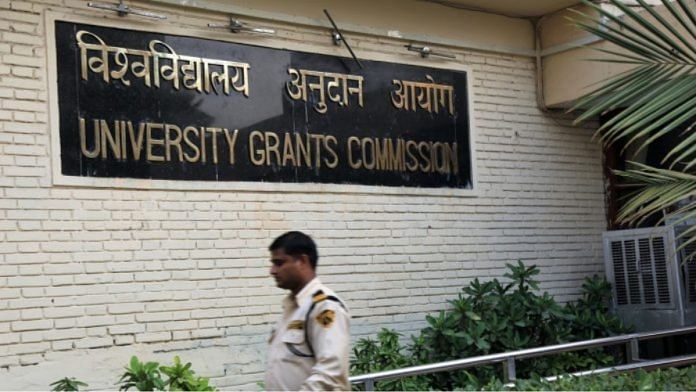New Delhi: The University Grants Commission (UGC) has revised the rules for admission to PhD programmes by including an entrance test for admission, apart from qualification through the existing National Eligibility Test (NET), ThePrint has learnt. The idea is to “reorient” PhD programmes across the country, officials said.
NET/JRF (Junior Research Fellowship), conducted by the National Testing Agency (NTA), is the exam that tests a student’s eligibility to enrol for a PhD in Indian universities. But now, 60 per cent of the total seats of the academic year for a PhD programme shall be filled by NET/JRF qualified students. The remaining 40 per cent shall be filled through the university/common entrance test.
The draft of the revised regulations — ‘UGC (Minimum Standards and Procedure for Award of Ph.D. Degree) Regulations, 2022’ — was approved in a commission meeting held on 10 March, UGC chairman M. Jagadesh Kumar confirmed to ThePrint. The document has been accessed by ThePrint.
The rules will soon be put on the official UGC website and made public. Based on the public feedback, the commission will finalise the regulations and send it to the Union Ministry of Education for approval.
For those who have qualified through NET/JRF, the selection will be based on interview/viva-voce.
For candidates who have passed the entrance test, the selection shall be evaluated in the ratio 70 (written test) to 30 (interview).
“Merit list for both shall be separately published. In case of unfilled seats in either of the categories, candidates from other categories can be requisitioned to fill up the vacant slots,” reads the policy document.
Also read: Lateral entry in teaching? UGC working to bring in experts without PhD or NET qualification
Syllabus, qualifying marks, selection of research area
The syllabus of the entrance test shall consist of questions that test research/analytical/ comprehension/quantitative aptitude of a candidate, the document reads. It will be conducted by individual universities and colleges that have been permitted to do so.
The university concerned shall devise its own admission procedure, along with eligibility conditions, to ensure that most of the seats under these categories are filled.
“Qualifying marks in the entrance test will be 50 per cent, provided that a relaxation of 5 per cent of marks (from 50 per cent to 45 per cent) shall be allowed for candidates belonging to SC/ST/OBC (Non-creamy layers)/Differently-abled category in the entrance examination conducted by the universities,” the document states.
“An interview/viva-voce has to be organised by the university/college concerned wherein the candidates are required to discuss their research interest/area through a presentation before a duly constituted departmental research committee,” it adds.
The interview/viva-voce shall also consider whether the candidate possesses the competence for the proposed research, if the research work can be suitably undertaken at the institution/college and whether the research topic is relevant.
The document also says that “selection of the area of research will get a special focus”.
“Research on socially relevant/locally need-based/ nationally important/globally significant/create value to the society or in cutting edge areas or contribute to new/additional knowledge in the areas of emerging concerns worldwide will be encouraged,” the policy document adds.
Obligations of supervisors
The revised policy document also has new sections on a supervisor’s obligations. The rules include that the supervisor should guide PhD candidates on whether the PhD project is feasible within the allotted time, explore the possibility that the project could lead to new results on a sufficiently high level to form the basis for a PhD thesis at an international level, and if there is enough time for the PhD student to have a realistic opportunity of submitting the PhD thesis on time.
“A good PhD programme requires that from the start of the PhD education there is a good working relationship between the student and the supervisor, in which the PhD student and the supervisor can reach an agreement on the demands and expectations placed on each other,” the document states.
It adds that the supervisor is also responsible for being in regular contact with the PhD student, serving as a sounding board for the research project, advising the student about relevant courses and conferences and assisting the student in establishing contacts with relevant national and international centers of research.
(Edited by Saikat Niyogi)
Also read: New schemes for students, regulations for online learning soon, says UGC head Jagadesh Kumar



